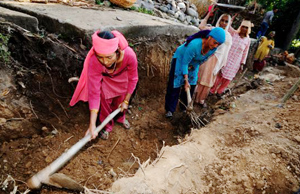New Delhi, Jul 3: The Socio Economic and Caste Census (SECC) 2011 today painted a grim picture of rural India, indicating that one out of three families living in villages is landless and depends on manual labour for livelihood.
The SECC 2011, also the first paperless census conducted on hand-held electronic devices by the government, said 23.52 per cent rural families have no literate adult above 25 years, suggesting a poor state of education among rural masses.
The census, carried out in 640 districts under the aegis of the Rural Development Ministry, was released jointly by Finance Minister Arun Jaitley and Rural Development Minister Chaudhary Birendra Singh here.
According to the census, there are a total number of 24.39 crore households in the country, of which 17.91 crore live in villages. Of these, 10.69 crore households are considered as deprived.
The deprivation data reveal that 5.37 crore (29.97 per cent) households in rural areas are "landless deriving a major part of their income from manual labour". As many as 2.37 crore (13.25 per cent) families in villages live in houses of one room with 'kaccha' walls and roof.
It further said 21.53 per cent, or 3.86 crore, families living in villages belong to SC/ST categories.
Releasing the census, Jaitley said, "It's after seven-eight decades that we have this document after 1932 of the caste census... It's going to be very important document for all policy makers both at central and state governments... this document will help us target groups for support in terms of policy planning."
The data, Singh said, "addresses the multi-dimensionality of poverty and provides a unique opportunity for a convergent, evidence based planning with a Gram Panchayat as unit".
Singh added a caveat, saying though the name of the census suggests caste, it does not include castes.
"The name of the report indicates (caste), but caste is not reflected in our data ... still the name is Socio Economic and Caste Census," he said.
"We are now on the cusp of a huge development shift that will move the numbers of poverty to the names of the village that needs government intervention. The idea is to deal with all aspects of the family simultaneously," Singh said.
The census further said just 4.6 per cent of all rural households in the country pay income tax.
As for sources of income, 9.16 crore households (51.14 per cent) depend on manual casual labour followed by cultivation (30.10 per cent).
It further said 2.5 crore (14.01 per cent) rural families are dependent on income from other sources which include government service, private sector and PSUs.
Besides, 4.08 lakh households fall back on ragpicking while 6.68 lakh depend on begging and charity alms.
"It's also a document which contains various details with regard to the specifics of regions, communities, caste groups, economic groups and give us an opportunity to measure the progress which households in India have made.
"Who are the ones who have qualitatively moved up in terms of quality of life and who are the ones in terms of geographical regions, social groupings which in future planning need to be targeted," Jaitley said.
"The data is an opportunity to make evidence-based selection, prioritisation and targeting of beneficiaries in different programmes," Singh added.
The Rural Development Ministry has taken a decision to use the SECC data in all its programmes.
"SECC data would have meaningful use in housing for all, education and skills thrust, MGNREGA, the National Food Security Act, interventions for differently-abled, interventions for women-led households, and targeting of households/individual entitlements on evidence of deprivation, etc," he said.
It paves the way for a Mission Antyodaya to work simultaneously in addressing the poverty of households through a Gram Panchayat Poverty Reduction Plan, he added.
The basic idea, the Minister said, is to implement a convergent, integrated poverty reduction plan, with Gram Panchayats and deprived households as a priority.





Comments
Add new comment